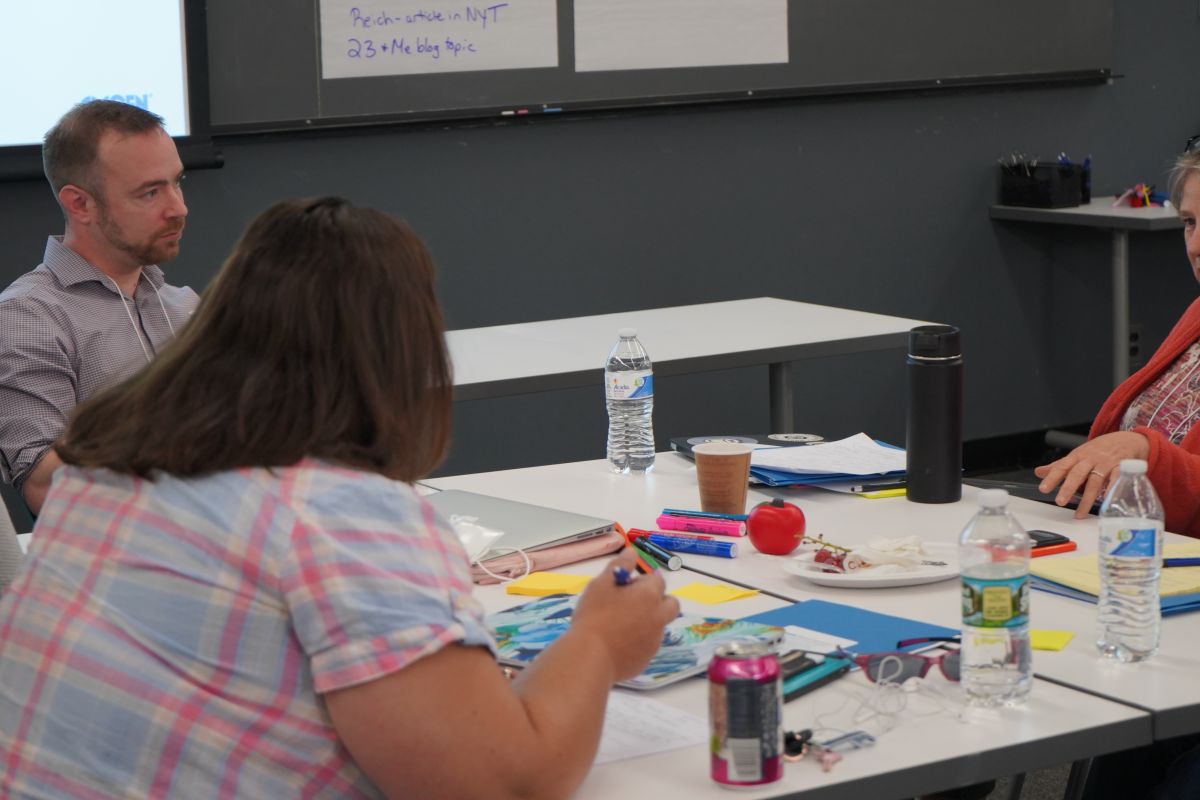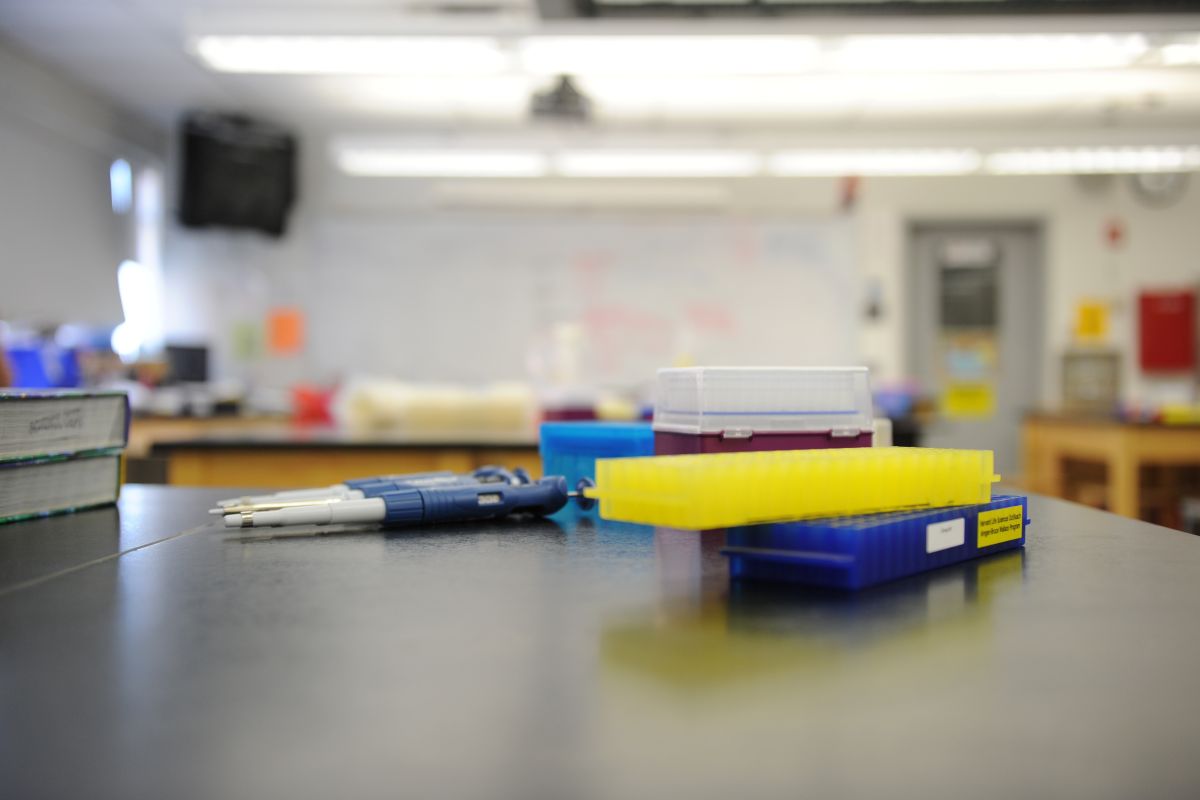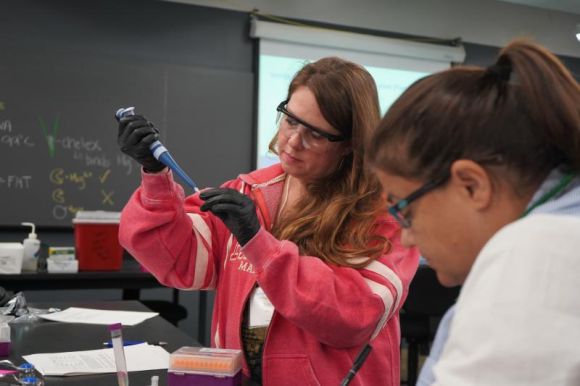Last fall, Amanda Dillingham (above, center) had a memorable encounter with Amgen senior scientist Luke Ward at an Amgen Biotech Experience (ABE) professional development institute at Harvard University. Having just been trained in a new ABE lab related to personalized medicine, Dillingham was eager to discuss the field with Ward and how it intersects with issues of race and ethnicity. As a scientist who works day to day at the intersection of genetics, medicine, and ethnicity, Ward was a rich source of information on the topic.
After the meeting, Dillingham was eager to continue the conversation, so that she could provide new resources to her students at East Boston High School. “Race and ethnicity comes up often in the biology classroom during topics of evolution and genetics,” Dillingham says. “I have noticed students coming in with misconceptions about biology, race, and genetics. As a biology teacher, I want to make sure that I have the correct information and understanding when I talk about evolution, personalized medicine, ethnicity, and genetics.”
Dillingham was not alone. In speaking with fellow teachers, it was clear that the topic arose frequently across schools and classrooms. So, Dillingham and colleagues put together a comprehensive set of questions on the topic for Ward to answer.
The resulting two-part Q&A is a resource for ABE and other biology teachers seeking to go more in depth on race, ethnicity, genetics, and personalized medicine with their students. In this part one of the Q&A, Ward talks about his work at Amgen and the differences between personalized medicine and pharmacogenetics.
Dillingham and team: Can you tell us a little bit about yourself? What do you do at Amgen and how did you get into biotechnology?
Ward: I was always interested in science, and growing up in the 1990s, our generation was told that “decoding” the results of the ongoing Human Genome Project was going to be our generation’s next big challenge. I studied biochemistry in college and then in graduate school got the chance to apply computers and statistics to the challenges of genetics and genomics. Finally, as a postdoc I got to work on human genetics for the first time, and knew I wanted to work with that subject as much as I could.
At Amgen, I work in our Comparative Biology and Safety Sciences department. My part of the lab uses human genetic data to better understand our drugs and the biological processes they target. Our job is to try to predict and prevent side effects that these new molecules might cause, while Amgen’s chemists and protein engineers are hard at work designing them and improving them.

Dillingham and team: So you are working in pharmacogenetics…. Can you please explain that more and how it differs from personalized medicine?
Ward: Pharmacogenetics is the science of whether certain inherited genetic variants are correlated with individuals’ response to drugs: if aspirin works best for me but ibuprofen works best for you, or if I get nauseous every time I get an allergy shot but most people don’t, is that because of some difference in our DNA? In some cases, genetics has turned up answers, but there is not necessarily a reason to think that genetics explains all differences in drug response; for example, maybe my immune system was exposed to something in childhood that makes me more prone to side effects from the allergy shot.
Personalized medicine is a term that has been advanced by health policy makers, and it refers to a vision for the future in which medical care will be more tailored to individuals’ unique biology. Of course, many people have countered that medicine has always been personalized, and that what we are really talking about is using genomic technology to increase the precision of medicine.
One important part of that personalized medicine vision is incorporating discoveries from the science of pharmacogenetics, but personalized medicine is broader. Personalized medicine includes other science like looking at mutations in tumors or “biomarkers” that can be picked up from a blood test, and it includes all the aspects that make medicine more than just science: developing new kinds of tests, figuring out guidelines for their use in the clinic, and enacting sound policy.

Dillingham and team: What tools are enabling these developments within medicine?
Without a doubt, the science that is enabling personalized medicine is being driven by our ability to study DNA and RNA from lots of people at low cost. In turn, that science has been driven by recent technological advances such as microarrays and high-throughput sequencing, both of which were catalyzed by the original Human Genome Project.
Dillingham and team: Can you give an example or two of successful applications of personalized medicine?
Ward: Some of the most successful applications to date have come from oncology. Targeted therapies for cancer, such as drugs that target HER2, are designed to only work in the subset of patients with a certain mutation in their tumors. And patients with an inherited cancer syndrome that gives them a high risk of a type of cancer may take preventative measures; for example, some women who discover they have a BRCA1 mutation will choose to undergo a prophylactic mastectomy.
Dillingham and team: Can you give an example from pharmacogenomics, of how genetic variations have affected drug development?
Ward: One great example of pharmacogenomics and pharmacogenetics has been the discovery of genetic variations that predispose people to serious side effects, which can then be tested before administering the drug. Often these involve deficiency of a liver enzyme that is essential for metabolizing the drug, such as CYP2D6 and codeine.
However, genetics is also important to drug development in a way that’s totally unrelated to pharmacogenetics: When we use human genetics to discover new correlations between gene variants and diseases, it teaches us more about the biology of those genes. Then, the proteins that those genes make can then become the targets of new drugs for those diseases, even if the gene variants that led to the discovery are very subtle or rare.
Dillingham and team: What do you think needs to happen for personalized medicine and pharmacogenetics to reach the next level of practice?
Ward: It’s one thing to do the science and discover these correlations, but much more complicated to put those discoveries into practice, because that involves technology development, weighing the economics and regulation of health care, and dealing with sensitive data. Luckily, there are major efforts to do new pharmacogenetic research and translate those from discoveries into the practice of medicine, thanks to government initiatives like the UK Biobank and the NIH’s Precision Medicine Initiative and All Of Us Research Project.
Check out Part 2, which includes a reference list.
